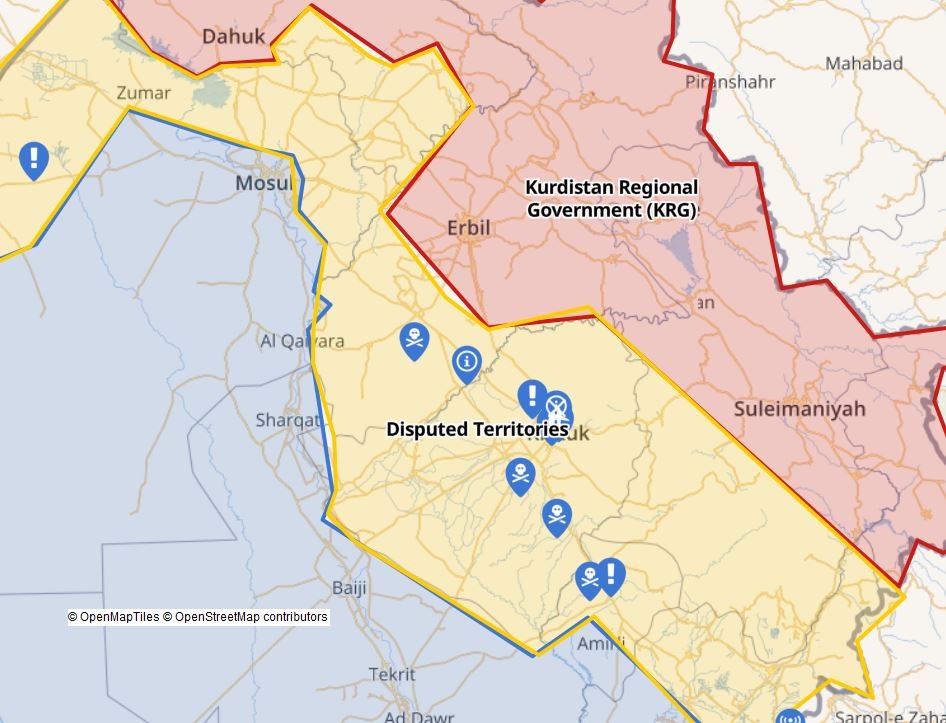1.1K
Kirkuk
- ISIS (Da’esh) attacks on Kirkuk’s sub-districts have been ongoing. On Monday, August 30th, a Da’esh IED targeted Iraqi federal police stationed near a bridge construction in Sohail village of Daquq sub-district. As a result of the attack, a construction worker was killed, and ten other people were injured, including eight police officers. The following day, Da’esh attacked farms near al Bashir village, killing 50 livestock and burning several farming machines and equipment. Further, On Wednesday, September 1st, Da’esh terrorists kidnapped a civilian in Sha’al village of the Dibis district. Villagers and security forces chased the Da’esh kidnappers and exchanged fire with them but failed to free the victims.
- On Tuesday, August 24th, National Security Advisor Qasim al Araji headed a senior security delegation to Kirkuk and held a meeting with security officials in the province. In the meeting, al Araji informed the factions of the Iranian-backed militias to evict their occupied intelligence building in Amal al Sha’abi, owned by the Kurdistan Democratic Party (KDP). Al Araji said the (KDP) will return to Kirkuk on September 25th. Iranian-backed militias occupied several buildings in Kirkuk, owned mainly by the KDP after October 16, 2017. According to sources, the delegation also discussed the new plans of forming joint forces between the Peshmerga and the Iraqis in the disputed territories.
- The North Oil Company (NOC) announced that 3,004,309 oil barrels had been exported through the Cihan pipeline, grossing 200,078,000 USD in August, averaging 96,900 barrels a day. In its monthly statistics publication, NOC said the selling price for each barrel was 66.597, which is 3.36 USD less than Basrah’s oil. Kirkuk’s oil production decreased by 9,000 barrels in August in comparison to July.
- The Turkish-backed Iraqi Turkmen Front, again rejected the return of the Peshmerga forces to Kirkuk. The Turkmen Front head Hassan Turan also announced that the party had filed a complaint in Iraq’s Constitution Court against the electoral distribution in Kirkuk since it is “unfair” for the Turkmen.
- In two different surveys conducted by the Standard Organization and Center for Freedom Promotion, the participation rate for the upcoming parliamentary election will not exceed 30%. According to the surveys, Kirkuk’s participation is expected to be only 18%, which is the lowest since 2003. Election campaigns have been ongoing since July, but voter apathy has been significant across the country.
- Since the announcement of a one hundred million Iraqi Dinar loan by al Rafidian bank for security personnel, many security officials are bringing homes and moving to Kirkuk and the Kurdistan region. The new buyers are from different parts of the country, mainly southern provinces. According to Iraq’s constitution, moving to Kirkuk province is prohibited until the implementation of article 140 of the constitution, which calls for normalizing the situation by reversing the decades-long Arabization policies against the Kurds which included genocide.
- Several Egyptian investment companies have visited Kirkuk recently, expressing interest in investing in the province, after holding meetings with Federal and local officials. Turkish and Iranian companies have won the majority of contracts in Kirkuk since 2003.
Khanaqin
- On Wednesday, September 1st, Da’esh terrorists attacked the Iraqi army stationed in the Islah village of Jalawla (Golala), resulting in seizing the village and burning military humvees. In the overnight hours, the Iraqi military attempted to control the village but six people were injured, including two army members, two children, and two women.
- Several civilian activists signed a petition and launched a campaign calling to create Khanaqin province and separate it from Diyala province. Khanaqin is one of the largest districts in the country, and it suffers from a lack of basic services, the fault of both the federal and provincial administrations.
Tuz Khurmatu
- Kurdish parties in Tuz Khurmatu held a meeting and discussed joint efforts of creating an agreement between the Federal Government and the Kurdistan Regional Government (KRG), similar to the Sinjar agreement. Representatives of parties suggested dialogue and consensus should hold among the components of the district, followed by a creation of a joint force by the locals. Since October 16, 2017, the Kurdish population has decreased while many remain displaced after Iraqi security forces and Iranian-backed militias occupied the town.
- The Security Cell announced the arrest of a female Da’esh cell on Friday, August 27th. According to the statement, the cell was responsible for the “facilitation” of Da’esh families.
Shingal (Sinjar)
- In a press conference, Jawhar Ali Bag, the Representative of the Yazidis’ Leader (Mir), criticized France’s President Emmanuel Macron for canceling his visit to Shingal. “According to his itinerary, France’s President was supposed to visit Shingal but later was canceled,” Said Ali Bag. President Macron participated in the “Baghdad Conference for Cooperation and Partnership.” and visited the Kurdistan region and Nineveh province, meeting community leaders and representatives, including Nadia Murad, the Yazidi activist and winner of the Nobel Peace Prize.
- On Monday, August 30th, US Consul General Robert Palladino emphasized the Sinjar Agreement between the Federal Government and the KRG. “The Sinjar Agreement is the best way forward to resolve the situation in Sinjar,” said Palladino. The US Consul General blamed both Iranian-backed militias and the Kurdistan Workers’ Party (PKK) for not abiding by the agreement. “ Unfortunately, the Iran-allied militia in Sinjar has refused to abide by the instructions of the Iraqi government. And this element continues to defy Iraqi authority. The PKK, which is present in the area and cooperates with the PMF [Popular Mobilization Forces], makes the situation even more volatile and unstable.”

